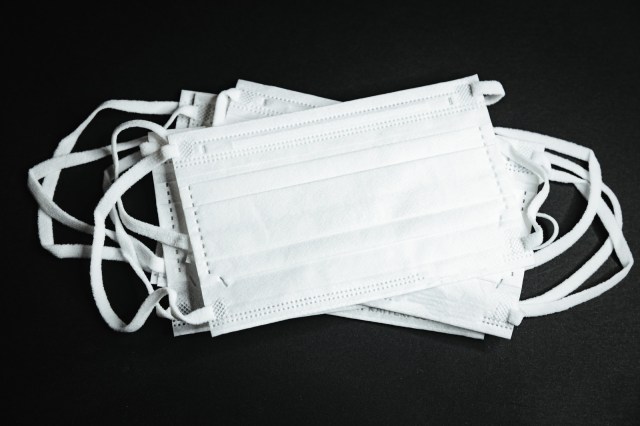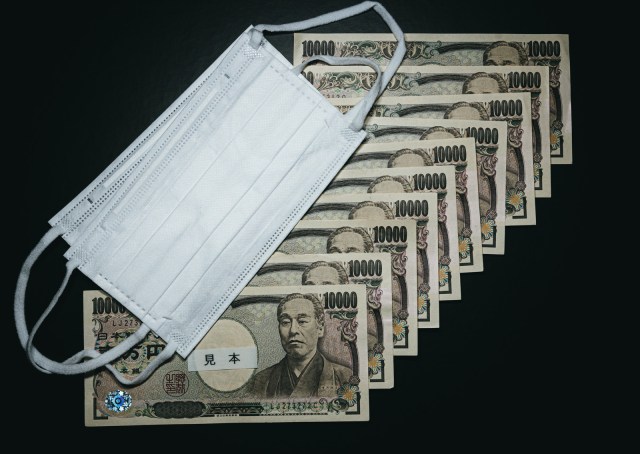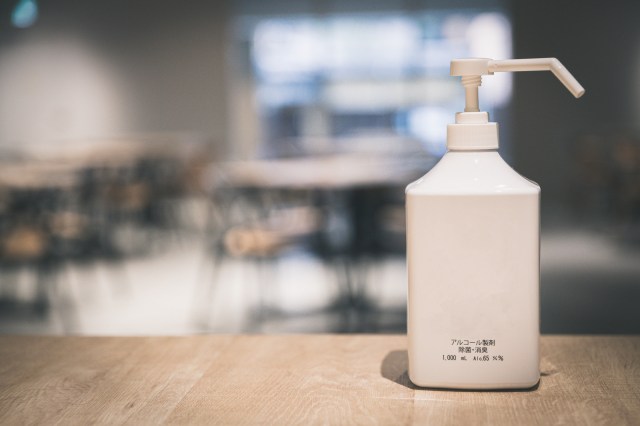
Is it too soon to allow people to resell hot public health commodities?
As you may well remember, when coronavirus started to become a worldwide issue back in March, people started to go a little crazy. A sudden skyrocket in demand for paper products, cleaning items, and non-perishable foods caused people to clear out store shelves in a matter of days. Even in Japan, the high demand for some products led to fights breaking out in the streets and multiple thefts.
In the middle of the panic, some people went so far as to buy up desirable items and reselling them at a premium. Even flour products were listed on yard-sale apps for two or three times the price. It became such a big problem for masks, an important public safety commodity, that the government had to step in and enact a ban on the resale of masks at marked up prices in March, with a steep penalties for violators. In June, they added hand sanitizer to the rule, too, as the need to keep hands clean as the country reopened spurred demand.
But now that the initial panic is over, and we have become accustomed to the “new normal” brought about by the coronavirus, the government feels it may be safe to release those bans. According to the Japanese Diet’s Consumer Committee, which met on August 20, the production and importation of masks and hand sanitizer has sufficiently recovered enough to keep up with the demand, and so the committee plans to lift the ban on August 29
Before the start of the pandemic, only 440 million masks were produced each month, but by June that amount had almost doubled to 800 million, and in August is projected to be nearer to 10 million. Hand sanitizer production, too, has increased over the summer to 6 million liters (1.6 million gallons), about six times as much as before.
“We believe it will be more than enough to handle the demand,” said the Consumer Committee.
Japanese citizens, however, are still worried. In Twitter reactions to a Yahoo! News! Japan article on lifting the bans, many netizens expressed concerns about the decision:
“Why are they lifting the ban? They should be adding more things to the list instead.”
“We finally just got to the point where shelves are getting restocked and we can buy them as normal again. Lifting the ban doesn’t make sense. We’re still limited on how many we can buy, and there are no Japanese makers on the shelves at all.”
“I cannot agree with this. Why ruin a system that is working? If you lift the ban, it will just result in a spiral of people buying up all the goods -> a shortage -> reselling -> price gouging again.”
“I don’t understand why they’re lifting the ban now. It’s going to be fall soon, and then winter, and we’ll need more and more masks and hand sanitizer.”
“It’s a stupid idea. The people who need them most won’t be able to get them anymore.”
“Have they even been to a drug store lately? The shelves where they keep the masks and hand sanitizers are still completely empty.”
Responses to the news were overwhelmingly negative, with many people believing that it would just initiate another shortage. Masks and sanitizer still aren’t always in stock in all Japanese stores, and with colder weather, and flu season, on the way, the demand for both products may rise even higher. The news itself might even spark panic buying, as people rush to buy products they’ll think they need before the resale ban is lifted and scalpers pick up everything to resell at a premium.
Or perhaps everything will be fine, as the government thinks. The government should know what they’re doing, right? The Committee currently plans to lift the ban on August 29, so I suppose we’ll have to wait and see how things go after that.
Source: Asahi News via Yahoo! Japan News, Twitter/@YahooNewsTopics
Top image: Pakutaso
Insert images: Pakutaso (1, 2)
● Want to hear about SoraNews24’s latest articles as soon as they’re published? Follow us on Facebook and Twitter!



 Flour products sell online for outrageous prices in Japan as demand for them skyrockets
Flour products sell online for outrageous prices in Japan as demand for them skyrockets Japanese government may encourage people to reuse masks as coronavirus-caused shortage continues
Japanese government may encourage people to reuse masks as coronavirus-caused shortage continues Hairs, insects and stains found in masks distributed by Japanese government
Hairs, insects and stains found in masks distributed by Japanese government Kyoto anime store shuts down suspected Chinese reseller’s attempted Evangelion bulk-order
Kyoto anime store shuts down suspected Chinese reseller’s attempted Evangelion bulk-order Kobe hospital robbed of 6,000 surgical masks
Kobe hospital robbed of 6,000 surgical masks Japan’s new difficult-to-drink-from beer glass protects your liver, but it’s a brutal experience
Japan’s new difficult-to-drink-from beer glass protects your liver, but it’s a brutal experience How to order snacks on a Shinkansen bullet train in Japan
How to order snacks on a Shinkansen bullet train in Japan Demon Slayer: Kimetsu no Yaiba gets new roller coaster attractions and food at Universal Studios Japan
Demon Slayer: Kimetsu no Yaiba gets new roller coaster attractions and food at Universal Studios Japan New Pokémon ice cream, dessert drinks, and cool merch coming to Baskin-Robbins Japan【Pics】
New Pokémon ice cream, dessert drinks, and cool merch coming to Baskin-Robbins Japan【Pics】 Burger King Japan suddenly adds Dr. Pepper and Dr. Pepper floats to its menu nationwide
Burger King Japan suddenly adds Dr. Pepper and Dr. Pepper floats to its menu nationwide Hello, cosmetics! Clinique teams up with Hello Kitty this summer for first-time collaboration
Hello, cosmetics! Clinique teams up with Hello Kitty this summer for first-time collaboration “The most Delicious Cup Noodle in history” – Japan’s French Cup Noodle wins our heart【Taste test】
“The most Delicious Cup Noodle in history” – Japan’s French Cup Noodle wins our heart【Taste test】 To combat declining birth rate, Japan to begin offering “Breeding Visas” to foreigners
To combat declining birth rate, Japan to begin offering “Breeding Visas” to foreigners Starbucks teams up with Japanese shochu brewery for a whole new coffee experience
Starbucks teams up with Japanese shochu brewery for a whole new coffee experience Studio Ghibli releases giant Totoro plushies in Japan
Studio Ghibli releases giant Totoro plushies in Japan Nintendo history you can feel – Super NES, N64, and GameCube controllers become capsule toys
Nintendo history you can feel – Super NES, N64, and GameCube controllers become capsule toys Starbucks releases a cute Frappuccino and Unicorn Cake…but not in Japan
Starbucks releases a cute Frappuccino and Unicorn Cake…but not in Japan Kyoto Tower mascot termination reveals dark side behind cute Japanese characters
Kyoto Tower mascot termination reveals dark side behind cute Japanese characters McDonald’s Japan’s Soft Twist Tower: A phantom ice cream only sold at select branches
McDonald’s Japan’s Soft Twist Tower: A phantom ice cream only sold at select branches Yabai Ramen: What makes this Japanese ramen so dangerous?
Yabai Ramen: What makes this Japanese ramen so dangerous? Finally! Nintendo Japan expands Switch 8-bit controller sales to everybody, Online member or not
Finally! Nintendo Japan expands Switch 8-bit controller sales to everybody, Online member or not Japanese government wants to build luxury resorts in all national parks for foreign tourists
Japanese government wants to build luxury resorts in all national parks for foreign tourists 10 things you should buy at 7-Eleven in Japan
10 things you should buy at 7-Eleven in Japan Studio Ghibli releases anime heroine cosplay dresses that are super comfy to wear
Studio Ghibli releases anime heroine cosplay dresses that are super comfy to wear Woman charged for driving suitcase without a license in Osaka
Woman charged for driving suitcase without a license in Osaka Studio Ghibli unveils My Neighbour Totoro miniature house model
Studio Ghibli unveils My Neighbour Totoro miniature house model Kyoto experiencing problems with foreign tourists not paying for bus fares, but not on purpose
Kyoto experiencing problems with foreign tourists not paying for bus fares, but not on purpose Fighting mild hunger with a Japanese soda that turns into jelly in the stomach【Taste test】
Fighting mild hunger with a Japanese soda that turns into jelly in the stomach【Taste test】 Studio Ghibli’s Howl’s Moving Castle tapestry unveiled in Japan for first time
Studio Ghibli’s Howl’s Moving Castle tapestry unveiled in Japan for first time McDonald’s new Happy Meals offer up cute and practical Sanrio lifestyle goods
McDonald’s new Happy Meals offer up cute and practical Sanrio lifestyle goods Sales of Japan’s most convenient train ticket/shopping payment cards suspended indefinitely
Sales of Japan’s most convenient train ticket/shopping payment cards suspended indefinitely Sold-out Studio Ghibli desktop humidifiers are back so Totoro can help you through the dry season
Sold-out Studio Ghibli desktop humidifiers are back so Totoro can help you through the dry season Japanese government to make first change to romanization spelling rules since the 1950s
Japanese government to make first change to romanization spelling rules since the 1950s Foreigner’s request for help in Tokyo makes us sad for the state of society
Foreigner’s request for help in Tokyo makes us sad for the state of society Ghibli founders Toshio Suzuki and Hayao Miyazaki contribute to Japanese whisky Totoro label design
Ghibli founders Toshio Suzuki and Hayao Miyazaki contribute to Japanese whisky Totoro label design Doraemon found buried at sea as scene from 1993 anime becomes real life【Photos】
Doraemon found buried at sea as scene from 1993 anime becomes real life【Photos】 Tokyo’s most famous Starbucks is closed
Tokyo’s most famous Starbucks is closed Princesses, fruits, and blacksmiths: Study reveals the 30 most unusual family names in Japan
Princesses, fruits, and blacksmiths: Study reveals the 30 most unusual family names in Japan Japan to reopen to international tourists with new entry requirements
Japan to reopen to international tourists with new entry requirements Hilariously mundane cosplays from “Jimi Halloween” 2020 in Tokyo【Photos】
Hilariously mundane cosplays from “Jimi Halloween” 2020 in Tokyo【Photos】 Applications for the ticket lottery for Tokyo 2020 Olympics matches and ceremonies are now open!
Applications for the ticket lottery for Tokyo 2020 Olympics matches and ceremonies are now open! Japanese student athletes facing criticism for selling pro baseball team’s gifts of dirt online
Japanese student athletes facing criticism for selling pro baseball team’s gifts of dirt online Japanese fashion company develops fabric mask with velcro-edge eating technology
Japanese fashion company develops fabric mask with velcro-edge eating technology Medi Lift: the Japanese beauty product that promises facelift results without surgery
Medi Lift: the Japanese beauty product that promises facelift results without surgery Tokyo Disneyland and Disney Sea will close for two weeks because of coronavirus fear
Tokyo Disneyland and Disney Sea will close for two weeks because of coronavirus fear Japanese tapioca bubble tea shops are suddenly becoming face mask shops
Japanese tapioca bubble tea shops are suddenly becoming face mask shops Okinawa man hired to steal 1,500 Pokémon cards arrested in Tokyo
Okinawa man hired to steal 1,500 Pokémon cards arrested in Tokyo Japanese government calling on citizens to drink more milk…again
Japanese government calling on citizens to drink more milk…again Mask rules in Japan have changed…so are people still wearing them?
Mask rules in Japan have changed…so are people still wearing them? Reading manga before you buy now officially OK again at Japan’s biggest second-hand bookstore
Reading manga before you buy now officially OK again at Japan’s biggest second-hand bookstore Japanese government to ease prohibition of cannabis-derived medicines
Japanese government to ease prohibition of cannabis-derived medicines A capsule toy vending machine pandemic shopping solution The My Gashapon Handle
A capsule toy vending machine pandemic shopping solution The My Gashapon Handle Japan’s supply of Zima runs dry, online resellers take over and jack up prices
Japan’s supply of Zima runs dry, online resellers take over and jack up prices
Leave a Reply